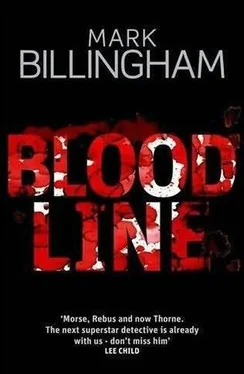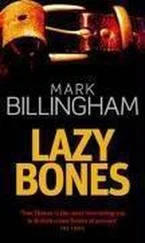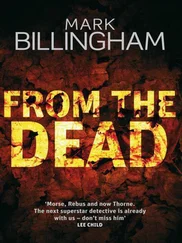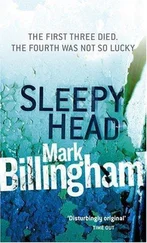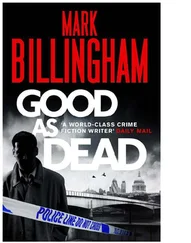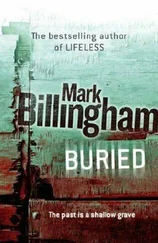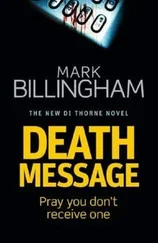‘What was his name?’
‘Anthony Garvey.’
‘“Anthony” was Ray Garvey’s middle name,’ Thorne said. ‘Sounds iffy to me.’ He sat back, shaking his head. ‘No… can’t be.’ He looked at Holland, who could do no more than throw up his hands.
‘Well, Garvey thought he was his son,’ Kambar said. ‘This man visited him several times a week for years. He had hundreds of letters from Garvey, too.’
‘What do you mean he made your life a misery?’ Holland asked. ‘Did he blame you for what happened to his father?’
‘Not so much that,’ Kambar said. ‘Although he obviously wasn’t happy about the consequences of the operation. No, he thought there should be a retrial-’
Thorne sat up very straight. ‘What?’
‘He wanted me to give evidence on his father’s behalf.’
‘Why on earth would there be a retrial? There was never the slightest doubt that Garvey was guilty.’
‘Never the slightest doubt that he committed the murders, certainly. ’
‘I’m not with you.’
‘Anthony Garvey was convinced that, were there to be a retrial, his father’s conviction would be overturned. They had been talking about it ever since Garvey was first diagnosed.’ He jabbed the tip of his pencil at the X-ray in Thorne’s lap. ‘They were convinced that the tumour had altered his personality; that effectively he had not been himself when he had killed those women. He wanted me to clear his father’s name.’
Thorne looked again at Holland, who was scribbling furiously. He glanced up, shrugged and returned to his notebook. Thorne turned back to Kambar, but could not think of anything to say. The information was still settling, the different strands becoming tangled as quickly as he tried to tease them out.
‘You still haven’t said what this is all about,’ Kambar said. ‘Raymond Garvey has been dead for over three years.’
Holland stopped writing. ‘I’m sure you understand that we’re not really at liberty to go into details.’
‘Of course.’ Kambar looked a little embarrassed, began to straighten some papers. ‘Just curious, that’s all. It would be nice to know what was going on.’
‘You’re at the back of a very long queue,’ Thorne said.
The Addenbrooke’s staff canteen was no more pleasant a place to eat lunch than its equivalent at Becke House. The food was probably a little better, as was the standard of conversation at the tables, but even on the top floor, which was dedicated to administration, there was no escaping that hospital smell.
Bleach and whatever else.
They carried their trays to a table in the corner, put down plates and cutlery, a bottle of still water and a can of Diet Coke. Both had plumped for the lasagne, though the doctor had chosen to accompany it with a green salad, which had almost, but not quite, prompted his visitor to put back his chips.
‘What will your colleague do for lunch?’ Kambar asked.
‘Not sure,’ Thorne said. They had rung through to make an emergency appointment with the governor at Whitemoor and, once it was confirmed, Holland had taken a cab back to Cambridge station. From there, it was a thirty-minute train journey to the small station at March, which was a short taxi ride from the prison.
‘He might get there in time to eat with the governor.’
‘Maybe,’ Thorne said. He guessed that Holland would prefer to make other arrangements. As far as smells that stayed with you long after you’d left the premises went, there wasn’t much to choose between a hospital and a prison. ‘He’ll probably just grab a sandwich on the train.’
Thorne and Kambar began to eat.
‘Is it possible?’ Thorne asked. ‘This change of personality business.’
‘Oh, personality change is certainly possible. I’ve dealt with a number of cases. But to the degree where you might murder someone? ’
‘Where you might murder seven someones.’
‘This is almost a Jekyll and Hyde thing we’re talking about.’
‘So?’
‘I was… dubious.’
‘You’re not saying it isn’t feasible, then?’
‘Almost nothing is hard and fast where the brain is concerned,’ Kambar said. ‘It’s nigh-on impossible to rule out anything completely, but there was no way I would have been willing to say that in a court of law.’
Thorne began picking up chips with his fingers. ‘I think I get it,’ he said.
‘Good. The lasagne’s better than normal today. It’s usually solid.’
Thorne knew plenty of doctors and scientists who would have trotted happily up to the witness stand in search of notoriety or a hefty fee. Who would have said that, although such a thing were unlikely, they could not say for certain that it had not happened. People of that sort – many of whom were virtually professional expert witnesses – were gifts to defence barristers seeking to get the likes of Raymond Garvey off the hook. Such testimony was almost designed to plant the seed of reasonable doubt within the mind of even the most sceptical juror.
The relatives of those murdered by Garvey should have been very grateful to Pavesh Kambar.
‘These cases you’ve dealt with,’ Thorne said, ‘how do these changes happen?’
Kambar raised his hand to demonstrate and it looked as though he might stab himself in the forehead, until he remembered and put down his fork. ‘The frontal lobe is what controls our cognition,’ he said. ‘It’s where the brain’s natural inhibitors are, where all the levels are set. It’s what makes us who we are.’
‘And a tumour can change that?’
‘Any foreign body, or any injury that affects that area. If the brain gets damaged, the personality can be affected. Altered.’
‘I read something in a paper once,’ Thorne said. ‘This woman suffered a massive head injury in a car accident and when she woke up she was speaking in a completely different language.’
Kambar nodded. ‘I’ve seen similar cases reported,’ he said. ‘But I’m not convinced. I think those kinds of things make good stories.’
‘So, what sorts of changes have you seen?’
‘Shy people who can suddenly become extremely gregarious. It’s usually a question of inhibition, of barriers coming down. Alcohol works in the same way in that it disinhibits the frontal lobe. Imagine someone who is very drunk, but without the falling over and the slurred speech. There are no… niceties, you know? Social graces go out of the window, the mark is overstepped.’
‘I’ve seen that,’ Thorne said.
Kambar shoved the last forkful of pasta into his mouth and waited.
Ignoring what was left of his lunch, Thorne found himself telling this man he had known for only an hour about the Alzheimer’s that had blighted his father’s final years and a few of his own. About the old man’s bizarre obsessions and the lifestyle that had grown increasingly erratic and disturbing. Kambar told him that the disease acted on the brain in precisely the way he had been describing.
‘People think it’s all about forgetting people’s names or where you’ve left your keys,’ Kambar said. ‘But the worst thing is that you forget how to behave.’
Thorne laid down his cutlery. Straightened it. ‘What about the whole genetic thing?’
Kambar nodded, understanding what he was being asked. ‘Look, it’s far from being definitive, but only something like fifteen per cent of patients with Alzheimer’s had parents who suffered from it; and even then the strongest genetic link is with the rarest forms, like early onset. We’re not talking about that, right?’
Thorne shook his head.
‘The fact that your father had it might increase your own susceptibility a little, but no more than that.’ Kambar smiled. ‘Dementia is very common, though, and chances are you’ll get it anyway, so I’d stop worrying. ’
Читать дальше
